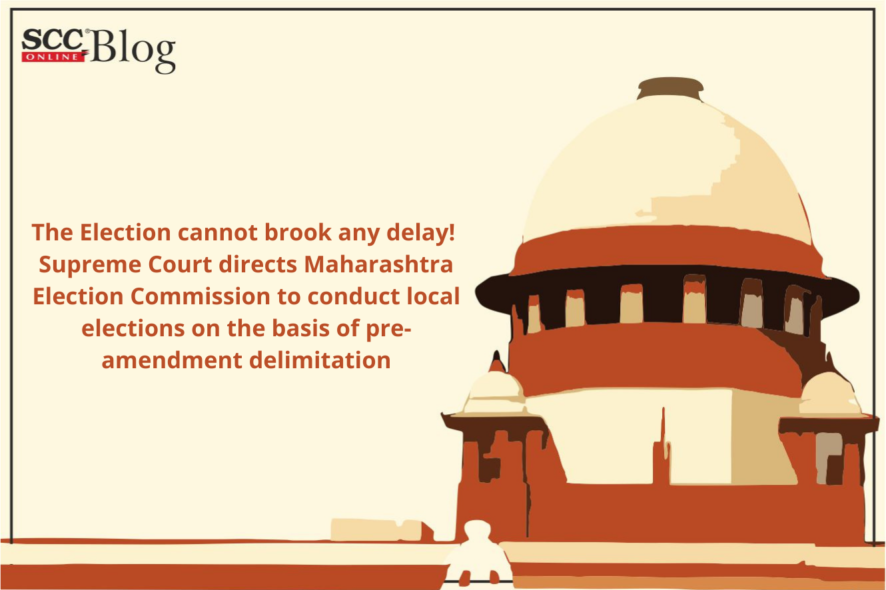Supreme Court: The Bench comprising of A.M. Khanwilkar, Abhay S. Oka and C.T. Ravikumar, JJ., directed Maharashtra State Election Commission to expeditiously conduct elections of local bodies (around 2486), which were pending for over 2 years (in some cases) due to disputed constitutional validity of State Amendments seeking to introduce delimitation in the State.
In the instant case the Constitutional validity of the Sections 2,3,4(1)(a) and 5 of the Mumbai Municipal Corporation Act, the Maharashtra Municipal Corporations Act and Maharashtra Municipal Councils, Nagar Panchayats, Industrial Townships Act (Amendment) Act, 2022, Sections 2,3,4 5 and 6 of the Maharashtra Village Panchayat and the Maharashtra Zilla Parishad and Panchayat Samiti (Amendment Act), 2022; and Section 2 of 5 the Mumbai Municipal Corporation (Amendment) Act, 2022 were challenged. The thrust of the challenge was that under the constitutional scheme, the authority regarding delimitation ought to be with the State Election Commission.
Opining that deeper analysis is required to examine the constitutional validity of the Acts in question, the Court listed the issue for further hearing on 12-07-2022.
Noticeably, earlier the Court had asked the Maharashtra State Election Commission to explain as to why the elections in large number of local bodies (around 2486) across the State, though overdue, and in some cases even overdue for two years, have not been taken forward despite the peremptory direction given by the Supreme Court on 03-03-2022. In its reply, the Commission had submitted that though the steps were taken at earnest to conduct elections, it could not take place due to impediments created by impugned amendments and pendency of delimitation.
In the above backdrop, the Court held that the process of delimitation being a continuous exercise may be continued by the State of Maharashtra, subject to the outcome of these petitions, but that would be relevant only for future elections after such exercise is completed.
The Court observed that the elections of local bodies which had become due on expiry of five years term and required to be conducted before expiry of such term could not brook any delay. Citing the decision of the Constitution Bench in Kishansing Tomar v. Ahmedabad Municipal Corpn., (2006) 8 SCC 352, the Court directed,
“…the election programme of such local bodies must proceed and the State Election Commission is obliged to notify the election programme within two weeks from today in respect of such local bodies including to continue with the process from the stage as on 10.3.2022, on the basis of the delimitation done prior to coming into force of the Amendment Act(s) w.e.f. 11.03.2022.”
The Court held that the delimitation as it existed prior to 11-03-2022 in respect of concerned local bodies be taken as notional delimitation for the conduct of overdue elections and the elections be conducted on that basis in respect of each of such local bodies.
With regard to question of reservation for scheduled castes and scheduled tribes, the Court clarified that the mandate of the Constitution and statutory provision must be followed; and in so far as other backward classes, compliance of triple test as predicated in Vikas Kishanrao Gawali v. State of Maharashtra, (2021) 6 SCC 73 must be adhered to.
The Court further clarified,
“We make it clear that until the delimitation is done by the State Government in terms of Amendment Act(s) of 2022, the State Election Commission shall give effect to this order also in respect of upcoming elections in respect of local bodies which would become due by efflux of time.”
[Rahul Ramesh Wagh v. State of Maharashtra, 2022 SCC OnLine SC 692, order dated 04-05-2022]






